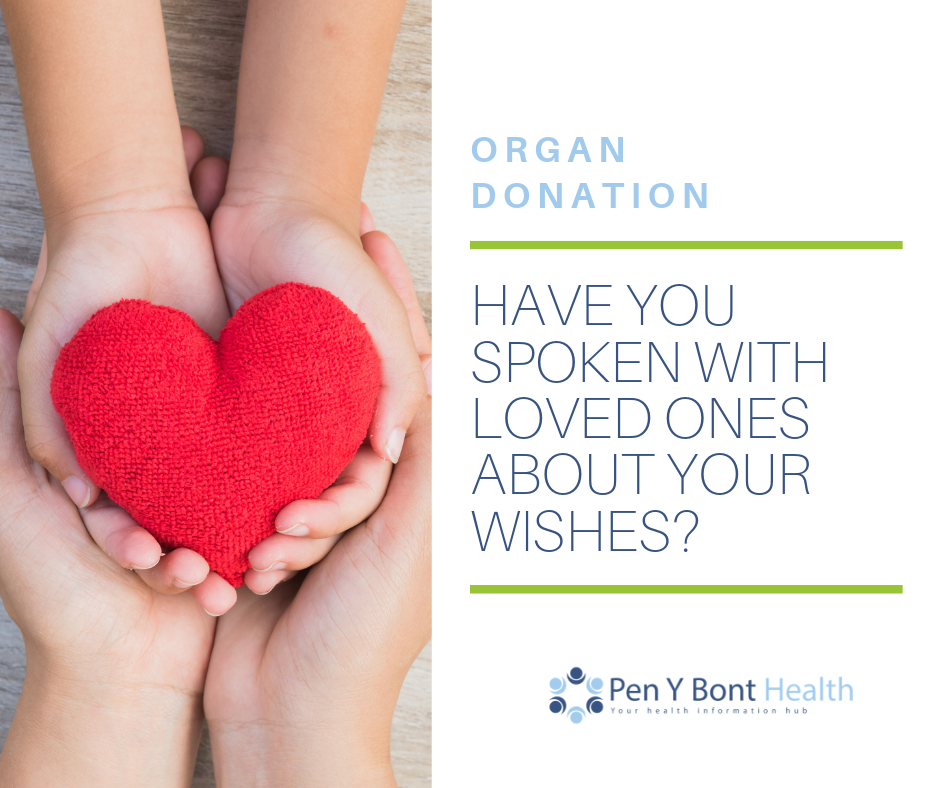 In Wales, if you have not recorded your decision (opt in or opt out), then you will be considered to have no objection to becoming a donor. This will also be the legislation in England from spring 2020.
In Wales, if you have not recorded your decision (opt in or opt out), then you will be considered to have no objection to becoming a donor. This will also be the legislation in England from spring 2020.
Donate your organs and save or transform up to nine lives.
According to the NHS around three people every day die whilst waiting for an organ this is because only 1% of the population actually die in circumstances that would allow them to donate.
There are three different ways to donate. These are:
• Brain stem death – This is where a person no longer has activity in their brain stem due to a severe brain injury.
• Circulatory death – This is the irreversible loss of function of the heart and lungs after a cardiac arrest from which the patient cannot or should not be resuscitated.
• Living donation – Donating organ or tissue while you are still alive.
Currently (as of July2019) there are 6181 people waiting for a transplant in the UK. Since April 2019 1083 people have received a transplant. There are more detailed statistics available here.
Video support
Watch the following video as the parents of an organ donor meet the boy she saved.
What organs can you donate?
There are lots of ways you can potentially save or improve the life (or lives) of others. You can donate your heart, lungs, liver, pancreas, small bowel, kidney and cornea, as well as making a tissue or bone donation.
Does ethnicity matter in organ donation?
For a successful transplant to take place, blood and tissue types need to match. Lots of Black and Asian patients are able to receive a transplant from a White donor however for many the best match will come from a donor with the same ethnic background.
More donors from Black, Asian and minority ethnic groups are urgently needed. This is because there has been an increase in the number of patients from the same communities in need of an organ transplant. Last year one in five people that died whilst waiting for a transplant were from a Black, Asian or ethnic minority background.
Whilst some people with a Black or Asian background go on to donate when they die, there are currently not enough donors compared to patients from those communities that are on the waiting list for a transplant. This means that patients are waiting significantly longer for a successful match.
Things to remember
1. Talking with your family about your choice to donate your organs when you die is a conversation worth having.
2. Making your wishes known to your family can potentially help them to make a difficult decision at an emotional and distressing time.
3. Should you die in circumstances that make organ donation a possibility then, as part of the end of life care discussion with your family, the medical team caring for you will discuss donation with your next of kin. Before talking with your family, a doctor or nurse will look at the NHS Organ Donor Register to see if you have recorded a donation decision.
4. For the people on the transplant list who are living every day in the hope that a donor will be found your decision to register could quite literally save or transform their lives.
Word from our GP
Dr Price ( PMC) says “The decision to donate can make a huge difference to the lives of families all across Wales that are waiting for a transplant.”
Register your details
If you are interested in donating your organs should you die, you can register your interest here.
